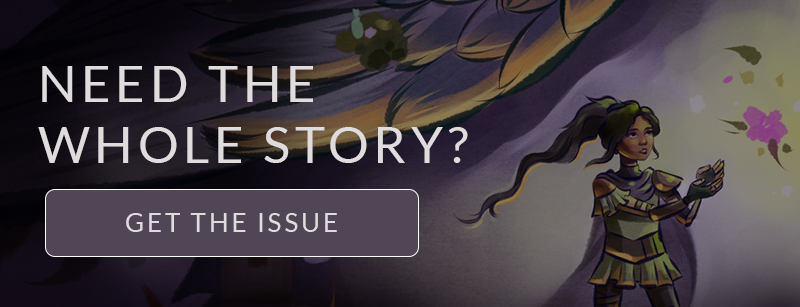by Michelle Mellon
Are We Ourselves?
Michelle Mellon
Are We Ourselves?
Content warning: Racism, intergenerational trauma, death, pandemic
Every night, before I went to sleep, my mother would recite “My People” to me. She’d whisper that poem like it was a lullaby. Like Langston Hughes himself sat on the other side of my bed, leaning in to hear if she did his words justice. And after a while, when I’d memorized the words too, my mother and I would chant them together in a soft duet.
Those are my happiest memories—among the scattering I know are truly my own. I have few other memories of my mother. I know she worked for the government. My father told me she was a neuroscientist and had been working on consciousness transfer technology long before things went bad. But she saw the early signs. She made the connections. And even though her warnings fell mostly on closed ears, the ones who did listen took her away.
I especially cherished that nighttime ritual with my mother in those empty years between her disappearance and when I was put into service. I kept my room as she’d last seen it, hoping one day she’d return to sit on my comic book comforter. She’d place my stuffed bunny next to me as I wrapped my hands in her braids and we’d cuddle, forehead to forehead, and say those words together.
I knew better, even before the linens had grown shabby and the doll decrepit. By then, I was old enough to recognize our special time for what it was. A safeguard, of sorts. To help me remember who I am. Because even in those early days, my mother knew that soon it would be too late to hold onto what made us real.
Soon, it would be the beginning of the end for us.
The night is beautiful
Always read the fine print. Isn’t that how that old saying goes? Oh, the great irony that the fine print of the United States Reparations Act of 2119 essentially sold the recipients and descendants of those payments back into bondage. Five hundred years after the first slaves were brought to the U.S., the Act was hailed as the official beginning of a post-racial America. Proven descendants of slaves were offered payments stemming from a complex formula of passage, labour, land, psychological suffering, and systemic discrimination. Like the lottery, recipients could receive their funds in one lump sum or paid out over the course of their or their children’s lifetimes. In return, there was a clause requiring unwavering loyalty to the principles and administrative actions deemed necessary by the government.
At the time, of course, the clause was just a symbolic show of fealty. So, my grandfather claimed his share. And the bill didn’t come due for another two generations. No reasonable person could have predicted everything to follow. Apparently “duty to the greater good of the country” meant giving up ownership of your body when it was deemed “vital to the survival of the republic.” My mother’s conjectures lived outside of the world of politics. She had merely connected some dots between what we’d done to the world environmentally, and our efforts to escape the repercussions. Some legislative wonk had discovered how to use USRA2119 to conscript Black Americans into playing experimental hosts and, when that experiment panned out, The Reparations Act put the final nail in our coffin.
What held true for centuries past still held true—where the U.S. led, other nations followed. Those that had the resources, but had no significant Black population of their own to harvest (or legal means to do so), turned the African continent into a tacitly sanctioned source for human trafficking.
As James Baldwin once said, “People are trapped in history and history is trapped in them.”
So the faces of my people
As I stood over his grave, they told me I looked like my father. The aunties and uncles who at some point must have meant something to me, but in my grief were just extras murmuring meaningless condolences. I wasn’t grieving him—he died the day the government took my mother away. I was grieving the lost opportunity to one day break through his wall and get him to tell me more about her. And them. And us.
I thought I found her once. In my head, outside of that bedtime routine. A warm memory of a familiar silhouette in a dress with an apron, arms spread wide on the porch of a yellow farmhouse with a bright red door. And me, running across a newly shorn grass field until I pull up short at the bottom of the steps.
Because I’ve never been to a farm. I spent my entire childhood in a second-floor walkup in the city. This woman is not the comforting colour of hot chocolate—no milk—with strong hugging arms and the lingering scent of sandalwood soap. This woman has auburn hair—no braids—and looks delicate, like straw. She is not my mother. This is not my memory.
Yet I can’t help feeling sad, somehow knowing only a few years stand between this woman and the smell of hospital disinfectant drowning out the country perfume of honeysuckle and manure and the sweet sweat of a loving son.
Continued in Augur Magazine issue 3.2…
MICHELLE MELLON has been published in nearly two dozen speculative fiction anthologies and magazines and is a member of the Horror Writers Association. Her first story collection, Down by the Sea and Other Tales of Dark Destiny, was published in 2018. She is currently working to complete her second collection.


